Sclerophantis is a genus of moth in the family Gelechiidae. It contains the species Sclerophantis cyanocorys, which is found in Indonesia (Java).

Conistra erythrocephala, the red-headed chestnut, is a moth of the family Noctuidae. It is distributed throughout Europe. and it is recorded from Asia Minor, (Amasia).

Catoptria pinella is a species of moth of the family Crambidae. It is found in Europe, North Africa and across the Palearctic.
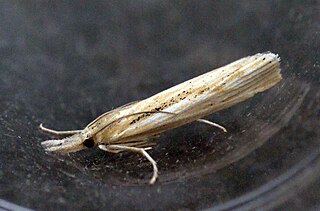
Pediasia aridella is a species of moth of the family Crambidae. It was described by Carl Peter Thunberg in 1788 and is found in Europe. There are three recognised subspecies.
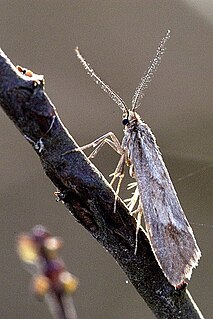
Diurnea lipsiella is a moth of the subfamily Chimabachinae. It is found in Europe.
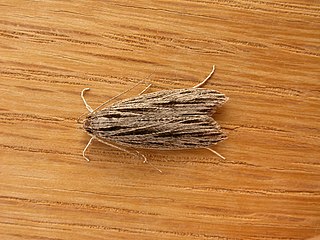
Leistarcha scitissimella is a moth of the family Xyloryctidae. It is found in Australia, where it has been recorded from the Australian Capital Territory, New South Wales and Queensland.

Catocala nymphagoga, the oak yellow underwing, is a moth of the family Erebidae. It is found in Southern Europe, from Bulgaria up to the Iberian Peninsula and sometimes further north as a migrant. It is also found in North Africa and Asia Minor.

The Essex y is a moth of the family Noctuidae. It is found from Italy to Greece, southeastern Europe, southwestern Russia, the southern parts of the Ural, Africa, Canary Islands, Arabia, southwestern Asia, Ceylon, from India to Nepal, southeastern China and Japan.

Agrochola helvola, the flounced chestnut, is a moth of the family Noctuidae. It was first described by Carl Linnaeus in his landmark 1758 10th edition of Systema Naturae. The species is found in most of Europe, north to Scotland and Fennoscandia up to the Arctic Circle, south to Spain, Sicily, Greece further east to the Middle East, Armenia, Asia Minor, western Turkestan and central Asia up to central Siberia.
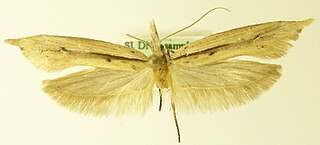
Ypsolopha mucronella is a moth of the family Ypsolophidae. It is found from Europe, through Siberia to Japan and in Asia Minor.
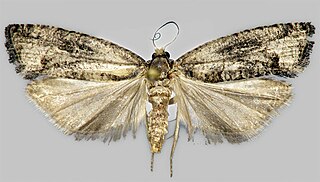
Epinotia maculana is a moth of the family Tortricidae. It is found in most of Europe, east to the eastern part of the Palearctic realm.
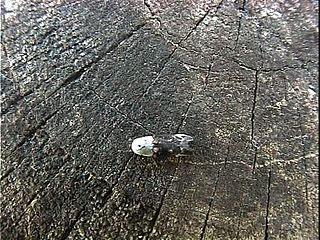
Trachypepla euryleucota is a species of moth in the family Oecophoridae. It is endemic to New Zealand.

Eana osseana, common name dotted shade, is a moth of the family Tortricidae.
Rhopalosetia is a monotypic moth genus in the family Copromorphidae. Its only species, Rhopalosetia phlyctaenopa, is found in French Guiana. Both the genus and species were first described by Edward Meyrick in 1926.
Garrha metriopis is a moth in the family Oecophoridae. It was described by Edward Meyrick in 1887. It is found in Australia, where it has been recorded from New South Wales.
Dicranucha strepsigramma is a moth of the family Gelechiidae. It was described by Edward Meyrick in 1937. It is found in South Africa.
Enchocrates picrophylla is a moth in the family Depressariidae. It was described by Edward Meyrick in 1886. It is found in Australia, where it has been recorded from South Australia and New South Wales.
Antaeotricha isosticta is a moth in the family Depressariidae. It was described by Edward Meyrick in 1932. It is found in Mexico.
Scythris rivigera is a moth of the family Scythrididae. It was described by Edward Meyrick in 1911. It is found in Namibia, South Africa, Zimbabwe and Yemen.
Scythris latebrosa is a moth of the family Scythrididae. It was described by Edward Meyrick in 1913. It is found in Mpumalanga, South Africa.











